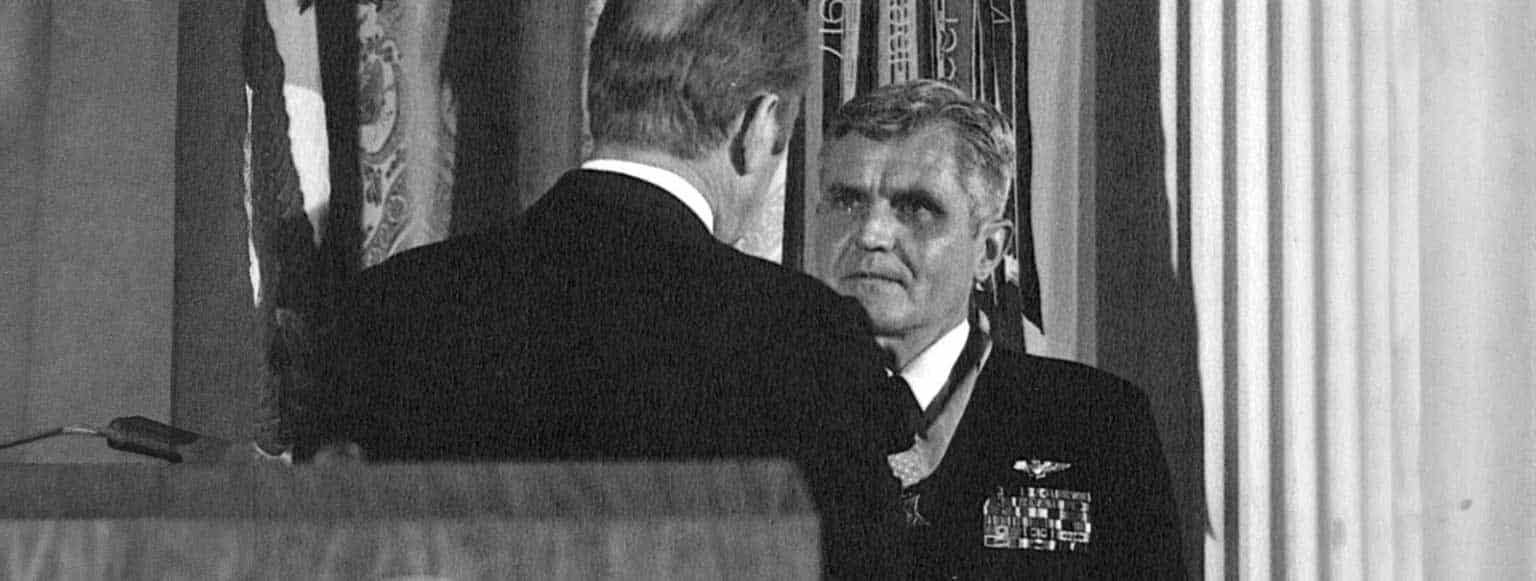Can Moral Excellence and Leadership be Taught

In 1981, Admiral James Stockdale delivered the Andrew R. Cecil Lecture on Morals in a Free Society. The lecture is titled “Education for Leadership and Survival: The Role of the Pressure Cooker,” and was published in The Ethics of Citizenship by the University of Texas at Dallas (no publication date given). Admiral Stockdale’s purpose is to examine the role of pressure, stress, or resistance in the development of moral character, but as we’ll see, he is considering the important question of whether leadership can be taught. This question is in fact an element of the larger question whether virtue, or moral excellence, can be taught. We come to an examination of this lecture at a moment when we have just completed a year-long consideration of the principles and traits of Marine Corps leadership, and so Admiral Stockdale has us consider an important element of the real-world conditions in which people grow and develop as human beings, and as leaders.
The lecture begins by observing that the concept of citizenship is a fundamental idea in Western civilization, and after a brief rehearsal of the idea writes:
“One of the primary duties of citizenship is its duty to education. By education I don’t mean just schooling. The idea of education is broader than that, important though schooling is. Schooling is a necessary element of education, but not sufficient completely to define it.
Marriage and family life are education. Sport, play, and entertainment are education. Religious training is education. Friendship is education. Military service is education. Any and every encounter with nature and society is education. Some social scientists call education in this comprehensive sense ‘acculturation.’ I prefer to call it more simply—’experience’.”
For Admiral Stockdale, an important and irreducible element of education in this sense, of experience, is stress or pressure. This is more than the natural kind of inner resistance one often feels when learning something new and challenging, or when trying to accomplish a difficult task, but includes importantly the circumstances in which one is called upon to act when the circumstances, though not necessary to the task at hand, impose challenges to accomplishing it. Even this, however, doesn’t quite reach what Admiral Stockdale is saying. “Stress is essential to leadership. Living with stress, knowing how to handle pressure, is necessary for survival. It is related to a man’s ability to wrest control of his own destiny from the circumstances that surround him. Or, if you like, to prevail over technology. Tied up with this ability is something I can express in one word, ‘improvisation.’ I mean man’s ability to prepare a response to a situation while under pressure.”
It is well known that Admiral Stockdale was a prisoner of war in Hanoi for eight years in which he was subjected to severe, even cruel, pressure aimed at getting him publicly to endorse anti-American propaganda. Admiral Stockdale was the senior officer in his prison, so he was the principal object both of abuse and what could be experienced as the allure of release from pain and close confinement simply by turning on his country. Admiral Stockdale gives an interesting analysis of the options before him while a prisoner of war, and the choice he maintained steadfastly can be explained in a Marine Corps idiom: he resolved to keep his honor clean. This meant enduring without stumbling the intense pressure of solitary confinement and torture over the course of several years. Admiral Stockdale explains how this happened as he presses in his lecture toward consideration of the question whether moral excellence and leadership can be taught, and the role of pressure, of challenges, in shaping one’s ability to understand a situation and to decide upon a proper course of action.
It is fairly common to find discussions of the ability to take good decisions skillfully and consistently as an ability one develops through practice, and while this is partly true, there is more required. The first requirement, as Admiral Stockdale explains, is to become a good human being, and this includes seeking always to understand what is true, and by carefully distinguishing that which is under one’s control from that which is not. This is presented in a fascinating discussion of the Roman senator and philosopher known generally as Boethius (d. 524 A.D.). Boethius was falsely accused of conspiracy against Theodoric, king of the Ostrogoths, whom Boethius served as an advisor. Theodoric put Boethius in prison and ordered his execution by bludgeoning. While in prison awaiting his execution, Boethius wrote a book in which Lady Philosophy visits him in prison to console him concerning his impending death. Admiral Stockdale writes:
“She is Lady Philosophy. She comforts him by telling him many things. That the world is governed by divine wisdom, not by blind chance. That we must not give too much importance to Fortune, for she is a fickle lady, taking away with one hand what she has given with the other. We must not become upset when she takes good things away from us. They were never ours to begin with. True happiness does not come from externals, she reminds him, but from within. True, life with its sudden falls of fortune is no easy thing. But would a good soldier fighting a tough battle stop to say to himself how unhappy he is? A wise man like Boethius ought not to bewail his struggles with fortune any more than a brave soldier should be scared by the noises of battle. Lady Philosophy reminds the prisoner of the wisdom of Socrates—that no evil can befall a good man
Boethius experienced a turn of fortune he did not survive, but under the pressure of waiting patiently to be clubbed to death, he composed a work of thought, The Consolation of Philosophy, that has been a consolation of wisdom for people from his death in the sixth century A.D. to today.
We human beings are moral and intellectual creatures. We are moral because we have wills, and thus the power of rational choice, and we are intellectual creatures because we have minds. If we are to grow, and become truly good human beings, both will and mind must be developed. This is the goal, to grow as moral and intellectual beings, that admiral Stockdale has in mind when discussing the duty of education, and this is done not just in a classroom, but in marriage and family, in sports and play, in religious training, in friendship, in military service, and in every encounter we have with the world around us, or what Admiral Stockdale calls more simply: experience. Here we find an interesting aspect of Admiral Stockdale’s concern to explain the importance of pressure to moral and intellectual growth. We can see among the people we meet over time that some seem to be more fully developed than do others. An important cause of this variation in growth is the care with which one learns from experience; some people pay closer attention than others. One consequence of pressure, or stress, in action is to encourage us to pay closer attention to our experiences and thus to learn from them more fully. This is a more complete exposition of the first principle of Marine Corps leadership: know yourself, and seek self-improvement.
So then, can leadership and moral excellence be taught? General Gray has said that if you want a new idea, read an old book. Admiral Stockdale also held this view. He advises that we return to reading and teaching the classics of ancient Greece and Rome, for in these writings we find access to an intellectual maturity that is practically unavailable to everyday experience alone.
“When you read the classics in the humanities, you become aware that the big ideas have been around for a long time, despite the fact that they are often served up today in modern psychological ‘explanations’ of human action as novel and ‘scientific.’ We didn’t have to wait for Horney, Erikson, and Maslow to give us the notion of self-fulfillment or self-actualization. They were there in Aristotle’s treatises on psychology and ethics all along. Of course, modern psychotherapists have to touch them up a bit to bring them up to date, by injecting a heady dose of personal individualism. This would have puzzled Aristotle. He would not have understood what good it does to discover ‘the real Me.’ He thought that self-realization could not be achieved without service to the community [that is, participation in the life of the community], in his case, the city-state.”
How then to teach leadership and moral excellence? This is a difficult question because we are not all equally talented in the many ways humans can be talented. Moreover, we cannot analyze moral excellence and leadership into sure-fire processes guarantied to result in morally excellent leaders. Like so many other aspects of life, in order to achieve something, a person has to want to achieve it, and this implicates the importance of marriage, family, friends, in short, of culture, the experience of which tends to produce people who want to be good men and women, and good citizens, no matter what else they will do with their lives.
Admiral Stockdale quite justifiably finds in Aristotle a practical answer to the question of teaching leadership and moral excellence.
“Aristotle has a lot of common sense to offer on this question of the teaching of moral excellence and leadership. His answer to the question has been taken up into the Western tradition, modified by Locke in the 17th century and by Rousseau in the 18th, then shaped by our own founding fathers, particularly by Thomas Jefferson, author of our Declaration of Independence. We are not born good, but we naturally are adapted to become so. And this adaptation means building character by habit and training on a basis of free choice. ‘Neither by nature nor contrary to nature do the moral excellences arise in us,’ Aristotle says, ‘rather we are adapted by nature to receive them, and made perfect by habit.’ (Nichomachean Ethics, 1103a 24-26.)
For Aristotle, and for the Scholastic thinkers of the Middle Ages, a habit is more than a practice one has become accustomed to doing, but rather a habit becomes an aspect of one’s mind and will, and thus an essential element of who one is. Leadership and moral excellence can be taught, but it takes time and attention, both of which do their work more effectively in the presence of headwinds, of the pressure that focuses our attention and encourages the determination to achieve a goal.

https://en.wikipedia.org/wiki/James_Stockdale

